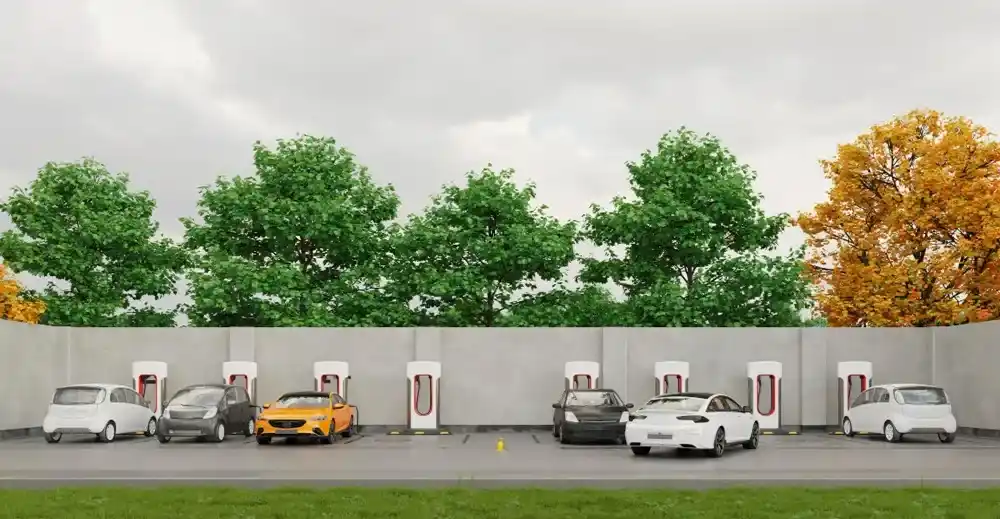Hydrogen Fuel Cell Vehicle Market- A Key to Overcome the Environmental Challenges in the Automotive Sectors

The hydrogen fuel cell vehicle market was valued at US$460.428 million in 2020, The market is expected to grow at a CAGR of 46.65% over the forecast period to reach a total market size of US$6717.320 million in 2027.
Hydrogen fuel cell vehicles (FCVs) are zero-emission vehicles. These vehicles have a fuel cell stack that converts hydrogen gas which is stored onboard with oxygen from the air, which powers the vehicle’s electric motor. The only byproducts of this process are water and heat, which makes these hydrogen fuel cell vehicles a very promising technology for the future owing to their sustainable nature. Additionally, these hydrogen fuel cell vehicles have a great potential to reduce the dependence on foreign oil and harmful emissions that are mostly the result of using non-renewable energy sources to power the vehicles. The cutting-edge technology of hydrogen fuel vehicles can enable its users to contribute more positively towards the climate change goals, which is the current need as well as an emerging trend. Furthermore, the research to tap into the potential of the advanced control systems for FCV technology is acting as a driving factor in the growth of the hydrogen fuel cell vehicle market.
The increasing awareness of automotive emissions on the environment is expected to boost the production of hydrogen fuel cell vehicles.
To reduce the impact of automotive emissions on the environment, many companies in the automotive sector have started to explore the alternatives such as hydrogen fuel cell technology. For instance, in September 2021 Ballard Power Systems launched FCmoveTM -HD+, the newest high-performing zero-emission fuel cell engine for commercial buses and trucks. The newly launched fuel cell engine is more than 40% compact and 30% lighter than the previous 100kW module, claims Ballard. The company also states that the FCmoveTM -HD+ has 50% fewer components which allows a 40% improvement in the lifecycle cost of the module while maintaining its high performance, efficiency, and wide operating range, with this launch, the Ballard Power Systems aims to continue their global leadership and technological advancements of the hydrogen fuel cell. Additionally, the company claims that these price reductions in fuel cell technology have been driven by innovations in technology and product improvements. Also, the factors such as the reduced price of the hydrogen storage tank reduced price, improved integration of the vehicle’s electric powertrain, and combining smaller fuel cell with lithium batteries has resulted in further reduction in the price of hydrogen fuel cell vehicles.
Additionally, Ballard is planning to further reduce the cost of fuel cell systems with the help of a strategic partnership that will enable the aim of accelerating industrialization, also by leveraging supply chain development to access diverse suppliers. Furthermore, the company aims to focus on internal projects to reduce the fuel cell stack costs by choosing lower-cost carbon instead of metal for bipolar plates, automating production lines, and implementing design and throughput scale-up. With these efforts, the overall lifecycle cost of hydrogen fuel cell vehicles will be reduced over time making the technology more accessible to the global population.
During the projected period, the rising fuel prices are expected to have a ripple effect on the market for hydrogen fuel cell vehicles, expanding the market.
The high demand for gasoline is pushing its price upwards year on year. As per the IEA report 2022, in the first week of January 2021, the gasoline price stood at US$0.7 per liter in the US, and the price surged to US$1.0 per liter in the first week of January 2022. The price of gasoline is further surging in the US and globally. According to the latest weekly gasoline price trend report by IEA stated that the US had to pay US$1.2 per liter for gasoline in April 2022. Furthermore, these rising prices are creating holes in the pockets of general consumers, and the use of non-renewable fuel is worsening the effects of climate change all over the globe, which is ultimately leaving a negative impact on global climate goals. Whereas, on the other hand, hydrogen fuel cell vehicles can reduce the impact of climate change, as these vehicles run on hydrogen gas rather than gasoline. Hydrogen fuel cell vehicles ultimately tackle the issue of high gasoline prices and harmful emissions along the way, which acts as a primary factor attributing to the surging demand for hydrogen fuel cell vehicles across the world.
During the forecast period, the Asia Pacific regions hold immense potential for considerable growth in the hydrogen fuel cell vehicles market.
By geography, the hydrogen fuel cell vehicle market is divided into North America, South America, Europe, the Middle East and Africa, and the Asia-Pacific. The North American and European markets are known for their early adoption of new technology and high-stake initiatives in terms of global climate protection. Additionally, the environmental safety regulations adopted by the countries in these regions are further accelerating the efforts to adopt more sustainable environmental solutions like hydrogen fuel cell vehicles. Therefore, these regions will witness growth in the hydrogen fuel cell vehicle market due to the presence of state-of-the-art infrastructure. According to CSIS (Center for Strategic and International Studies), China is already the largest hydrogen producer and third-largest market for FCVs in the world with 8400 FCVs deployed in China at the end of 2020. Furthermore, the provincial governments and commercial enterprises in China have launched projects to support fuel cell vehicle deployments. Also, countries like Japan and South Korea are supporting the key market players in the hydrogen fuel cell vehicle market. These key developments indicate higher growth in the Asia-Pacific countries.
COVID-19 Insights
The coronavirus pandemic had a significant influence on the hydrogen fuel cell vehicle market. As most of the important industries were temporarily shut down due to the COVID-19 pandemic, the global economy witnessed a downward trend. The overall automotive industry was negatively impacted by the pandemic. The industry suffered due to the extensive lockdowns and stoppages on the production units. The sale of automobiles was also affected as consumer preference shifted from luxurious goods to essential goods and services owing to the fluctuations in the market. Furthermore, due to supply chain disruptions and lack of labor in the market, the automotive production units suffered massive slowdowns. This in turn affected the overall demand and supply chain of the automotive industry, which further affected the growth of the hydrogen fuel cell vehicles market globally.
Hydrogen Fuel Cell Vehicle Market Scope:
| Report Metric | Details |
| Market Size Value in 2020 | US$460.428 million |
| Market Size Value in 2027 | US$6717.320 million |
| Growth Rate | CAGR of 46.65% from 2020 to 2027 |
| Base Year | 2020 |
| Forecast Period | 2022–2027 |
| Forecast Unit (Value) | USD Million |
| Segments Covered | Type, And Geography |
| Regions Covered | North America, South America, Europe, Middle East and Africa, Asia Pacific |
| Companies Covered | Toyota Motor Corporation, Hyundai Motor Company, BayerischeMotoren Werke AG, Mercedes-Benz Group AG, Honda Motor Company, Nikola Corporation |
| Customization Scope | Free report customization with purchase |
Get in Touch
Interested in this topic? Contact our analysts for more details.
Latest Thought Articles

Top OSAT Companies Driving Semiconductor Assembly and Test Services Worldwide
Recently
EV Charging Stations Market Outlook: Smart Charging, Fast Charging, and Regional Expansion
Recently
Future of Corporate Wellness: Global Trends and Regional Outlook
Recently
Regional Breakdown of the Mechanical Keyboard Market: Who Leads and Why?
Recently